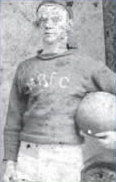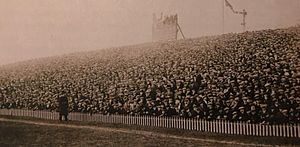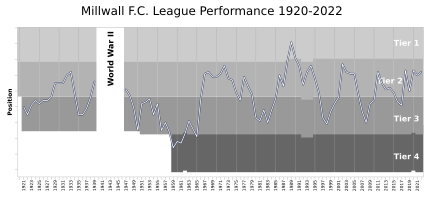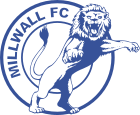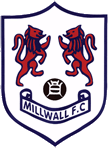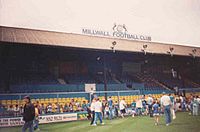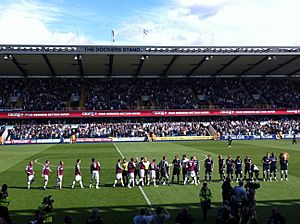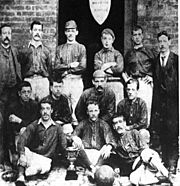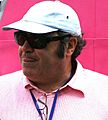Millwall F.C. facts for kids
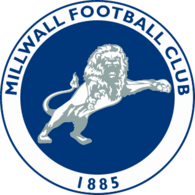 |
||
| Full name | Millwall Football Club | |
|---|---|---|
| Nickname(s) | The Lions | |
| Founded | 1885, as Millwall Rovers | |
| Ground | The Den | |
| Capacity | 20,146 | |
| Owner | Millwall Holdings | |
| Chairman | James Berylson | |
| Head coach | Alex Neil | |
| League | Championship | |
| 2018–19 | Championship, 21st of 24 | |
|
|
||
Millwall Football Club is a professional football team based in Bermondsey, South East London, England. They play in the EFL Championship, which is the second highest league in English football.
The club started as Millwall Rovers in 1885. Even though they haven't played in the original Millwall area of the Isle of Dogs since 1910, they kept the name. From 1910 until 1993, they played at a stadium now called The Old Den. Then, they moved to their current home stadium, The Den, which is nearby.
Millwall's traditional badge shows a rampant lion, which is why their nickname is The Lions. Their team uniform usually has dark blue shirts, white shorts, and blue socks.
Millwall was one of the first teams to join the Southern Football League in 1894. They played in this league for 22 seasons, winning the title twice in 1895 and 1896. They joined the Football League in the 1920–21 season. Since then, they have been promoted 11 times and moved down a league nine times. They have spent most of their time in the second and third levels of English football.
The club had a short time in the top league between 1988 and 1990. Their best ever league finish was tenth place in 1988–89. Millwall reached the 2004 FA Cup Final and played in a European competition (the UEFA Cup) for the first time. They have also won two League One play-off finals (in 2010 and 2017) and the Football League Group Cup in 1983.
Millwall supporters are known for their famous chant, "No one likes us, we don't care". Millwall has a long-standing rivalry with Premier League team West Ham United. This local derby has been played almost 100 times since 1899. Millwall also has a rivalry with Leeds United. They also play in the South London derby against local teams like Crystal Palace and Charlton Athletic.
Contents
- Club History
- Early Years and Moving South: 1885–1920
- Joining the Football League: 1920–1940
- Wartime and Lower Leagues: 1940–1965
- Unbeaten Home Record and the Class of '71: 1965–1986
- Top Tier, New Stadium, and Challenges: 1987–2000
- Champions, FA Cup Final, and European Football: 2000–2007
- New Owner, Stability, and Play-off Success: 2007–2015
- Harris Era, Championship Return, and FA Cup Upsets: 2015–2023
- Chairman's Passing and Recent Seasons: 2023–2025
- Team Colors, Badge, and Nickname
- Stadiums
- Traditional Songs
- Rivalries
- Players
- Managers
- Club Officials
- Honours and Achievements
- Club Records and Statistics
- Millwall in European Football
- Supporters and Crowd Behavior
- Notable Supporters
- Images for kids
- In the Community
- See also
Club History
Early Years and Moving South: 1885–1920
Millwall Football Club started as Millwall Rovers in 1885. It was formed by workers from J.T. Morton's factory in the Millwall area of London's East End. Many workers came from different parts of the country, including Scotland. The club secretary was 17-year-old Jasper Sexton.
Millwall Rovers played their first game on October 3, 1885, losing 5–0 to Fillebrook. Their first home game was on October 24, 1885, at Glengall Road, where they won 2–1 against St Luke's.
For the 1886–87 season, Rovers found a better place to play behind the Lord Nelson pub, which became known as the Lord Nelson Ground. In November 1886, they won the first East London Senior Cup. They won this cup again in the next two years, so they got to keep the trophy.
In April 1889, the club changed its name to Millwall Athletic. This was because they moved to a new home called The Athletic Grounds. They were founding members of the Southern Football League and won it in their first two years. They also reached the semi-finals of the FA Cup in 1900 and 1903.
In 1901, they had to move again to North Greenwich because their land was needed for a timberyard. On October 10, 1910, Millwall played their last game as an East London club.
Millwall then moved to a new stadium called The Den in New Cross, South East London, in 1910. This move helped the club grow its support. The first match at the new ground was on October 22, 1910, against Brighton & Hove Albion, which Brighton won 1–0.
Joining the Football League: 1920–1940
In 1920, Millwall, now simply called Millwall, was invited to join the Football League for the 1920–21 season. This happened when the new Football League Third Division was created. Millwall's first Football League match was on August 28, 1920, at The Den, and they won 2–0 against Bristol Rovers.
In the 1925–26 season, Millwall achieved a Football League record by having 11 games in a row without letting opponents score. In the 1927–28 season, Millwall won the Third Division South title. They scored 87 goals at home in the league that year, which is still an English record.
In the 1930s and 1940s, games against teams like Sunderland and Derby County drew huge crowds of over 48,000 fans. Their 1937 FA Cup run saw Millwall reach the semi-finals for the third time. A game against Derby still holds Millwall's record attendance of 48,762. By 1939, Millwall was one of the most popular teams in England, even though they were in the Second Division. They were also one of the richest clubs.
Wartime and Lower Leagues: 1940–1965
On April 7, 1945, Millwall played in a cup final at Wembley Stadium against Chelsea. This was during wartime, so it's not officially counted in the record books. The attendance was 90,000, the largest crowd Millwall has ever played in front of. Even King George VI was there.
The Den stadium was badly damaged by bombs on April 19, 1943. A week later, a fire also destroyed a whole stand. Other clubs like Charlton Athletic, Crystal Palace, and West Ham United offered their grounds for Millwall to play. Millwall returned to The Den on February 24, 1944, thanks to many volunteer fans who helped rebuild it.
After the war, Millwall's performance varied. They were relegated to Division Three South in 1948. In the 1952–53 season, they finished second in Division Three South, but only the champions were promoted. A highlight was a big upset in the 1956–57 FA Cup when Millwall beat Newcastle United 2–1 in front of 45,646 fans.
In 1958, Millwall became a founding member of Division Four. They won the Division Four title in 1962. They were relegated again in the 1963–64 season but quickly bounced back with two promotions in a row. This was the last time Millwall played in the fourth tier.
Unbeaten Home Record and the Class of '71: 1965–1986
Later in the 1960s, Millwall set an amazing record of 59 home games without losing. This streak lasted from August 22, 1964, to January 14, 1967. During this time, they played 55 different teams, kept 35 clean sheets, and scored 112 goals. This success was thanks to managers Billy Gray and Benny Fenton. The record was later broken by Liverpool.
In the early 1970s, Millwall had a strong team known as "The Class of '71." This team included players like Bryan King, Harry Cripps, Derek Possee, and Barry Kitchener. They almost got promoted to Division One, missing out by just one point. In the 1971–72 season, Millwall went unbeaten at home in Division Two. This made them the only club to go through an entire season without losing a home match in four different divisions.
George Graham managed Millwall from 1983 to 1986. He led the club to win the Football League Group Cup in the 1982–83 season. The 1984–85 season was very successful. Millwall reached the FA Cup quarter-finals and earned promotion to the Second Division. They were unbeaten at home again in Division Three.
Top Tier, New Stadium, and Challenges: 1987–2000
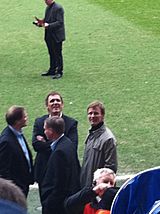
John Docherty took over as manager. In his second season, Millwall won the Second Division championship. This meant they were promoted to the top league of English football for the first time ever. They started the 1988–89 season very well, even topping the league for a while. This was largely due to the great scoring partnership of Tony Cascarino and Teddy Sheringham. Millwall finished their first top-division season in tenth place. The next season, they were relegated in 20th place.
After Docherty left, Bruce Rioch became manager. Striker Teddy Sheringham was the top scorer in the Football League in the 1990–91 season with 38 goals. He was later sold for £2 million. Mick McCarthy became manager in 1992. He led Millwall to third place in the new Division One at the end of the 1993–94 season.
This was their first season at a new stadium, first called The New Den, but now simply The Den. It opened on August 4, 1993. This new ground was the first all-seater stadium built in England after the Hillsborough disaster. Millwall also reached the League Cup quarter-finals for the third time in 1995. McCarthy left in 1996 to manage the Republic of Ireland national team.
Jimmy Nicholl became the new manager, but Millwall was relegated at the end of the 1995–96 season. The club faced serious money problems and was put into financial administration for a short time. After this, new chairman Theo Paphitis appointed Billy Bonds as manager.
Keith Stevens and Alan McLeary later became joint-managers. They led Millwall to their first official appearance at Wembley Stadium in the 1999 Football League Trophy Final. They lost 1–0 to Wigan Athletic with many of their own fans watching. Millwall finished 5th in the 1999–2000 season and lost in the play-off semi-finals.
Champions, FA Cup Final, and European Football: 2000–2007
Mark McGhee became Millwall's new manager in September 2000. Eight months later, the club won promotion as Division Two champions. They earned a club record 93 points, with striker Neil Harris scoring 27 league goals. This period saw many talented players emerge, like Tim Cahill, Paul Ifill, Lucas Neill, and Steven Reid.
In the 2001–02 season, Millwall finished 4th and qualified for the Division One play-offs, but lost to Birmingham City. McGhee left the club in October 2003.
In October 2003, former Chelsea and England player Dennis Wise became player-manager. In his first season, Wise led the team to their first ever FA Cup Final. Millwall beat Sunderland in the semi-final, with Tim Cahill scoring the winning goal. They faced Manchester United in the final on May 22, 2004, at the Millennium Stadium in Cardiff. Millwall lost 3–0.
Because Manchester United had already qualified for the Champions League, Millwall earned a spot in the UEFA Cup. This was their first time playing in a European competition. In the 2004–05 UEFA Cup, Millwall lost 4–2 on aggregate to Hungarian champions Ferencváros.
In 2005, Theo Paphitis stepped down as chairman. The next three seasons (2005-08) saw many different managers. Millwall was relegated to League One on April 17, 2006. In September 2006, Theo Paphitis ended his nine-year connection with the club. Willie Donachie signed a two-year contract in March 2007 after the team improved. However, he was sacked in October 2007.
New Owner, Stability, and Play-off Success: 2007–2015
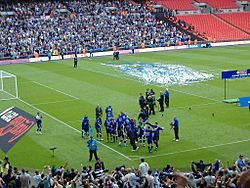
In March 2007, American businessman John Berylson invested £5 million into the club. He later became chairman. Millwall appointed Kenny Jackett as the new manager on November 6, 2007. Over the next two seasons, Jackett led Millwall to two top-six finishes in League One. On January 13, 2009, Neil Harris broke Teddy Sheringham's record for most goals scored for Millwall.
After losing a play-off final in the 2008–09 season, Millwall finally broke their play-off losing streak. They won 1–0 in the 2010 League One play-off final against Swindon Town. This secured their return to the Football League Championship after four years.
In the 2012–13 season, Millwall had a strong start but finished poorly. They narrowly avoided relegation. However, they reached the semi-final of the FA Cup for the fifth time. They played Wigan Athletic at Wembley Stadium on April 14, 2013, losing 2–0. Kenny Jackett resigned on May 7, 2013.
Steve Lomas was appointed manager on June 6, 2013, but was sacked on December 26, 2013. Ian Holloway became the new manager on January 6, 2014. Millwall finished the 2013–14 season in 19th place, avoiding relegation. The next season, Holloway was sacked, and Neil Harris became caretaker manager. Millwall was relegated to League One on April 28, 2015. Harris was then confirmed as the permanent manager.
Harris Era, Championship Return, and FA Cup Upsets: 2015–2023
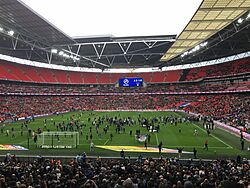
In his first full season, Neil Harris led Millwall to a fourth-place finish in League One. They reached the play-off final at Wembley but lost 3–1 to Barnsley. In the 2016–17 FA Cup, Millwall reached the quarter-finals for the tenth time. They made it to the League One play-off final at Wembley for the second year in a row. They were promoted back to the Championship after a 1–0 play-off final win over Bradford City, with a goal from Steve Morison.
In the 2018–19 FA Cup, Millwall reached the quarter-finals for the 11th time, losing to Premier League team Brighton on penalties. This season, Millwall broke their club transfer fee record twice. They bought Tom Bradshaw for £1.25 million and then Ryan Leonard for £1.5 million. They also received a record £8 million for selling George Saville.
On October 3, 2019, Neil Harris resigned as manager. He had led Millwall to two Wembley finals, one promotion, and two FA Cup quarter-finals. Gary Rowett replaced Harris on October 21, 2019. Rowett led the club to an 8th-place finish in the 2019–20 season, just missing the play-offs. He guided the club to 11th place in his second season and 9th place in the 2021–22 season. In 2022, Millwall broke their transfer record again to sign Zian Flemming for £1.7 million. In the 2022–23 season, Millwall almost secured a play-off spot on the final day but lost to Blackburn Rovers, finishing 8th.
Chairman's Passing and Recent Seasons: 2023–2025
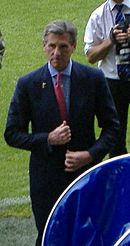
On July 4, 2023, the club announced that owner and chairman John Berylson had passed away in a car accident. His son, James Berylson, became the new chairman.
On October 18, 2023, the club and manager Gary Rowett agreed to part ways. On November 6, 2023, Millwall appointed England under-20s manager Joe Edwards as their new Head Coach. After a difficult period, Edwards was sacked on February 21, 2024. He was replaced by former player and record goalscorer Neil Harris, in his third time managing the Lions. Under Harris, the club finished 13th.
On June 15, 2024, the club's main goalkeeper Matija Sarkic passed away while playing for his national team, Montenegro. The 2024–25 season was Millwall's eighth year in a row in the second tier, which is their most successful period since 1996. On December 10, 2024, Neil Harris announced he would be leaving the club. Alex Neil was appointed as his replacement. He led Millwall to an 8th-place finish, just missing out on the play-offs on the final day of the season.
Team Colors, Badge, and Nickname
Kit
|
|
| Millwall Rovers first home kit from their 1885–86 season, which the team wore for the 125-year anniversary of the club in the 2010–11 season. |
Millwall's traditional uniform has mostly been blue shirts, white shorts, and blue socks for over 125 years. For the first 50 years, until 1936, they wore a dark navy blue, similar to the Scottish national team. This color was chosen to honor the Scottish roots of the club, as many of the first players were from Dundee.
In 1936, manager Charlie Hewitt changed the kit color to a lighter royal blue. The team played in this color for about 74 years, except for periods between 1968–75 and 1999–2001 when they wore all-white. For the 2010–11 season, to celebrate the club's 125th anniversary, Millwall went back to the darker navy blue of their first uniform and has kept this color since.
For away games, they often wear white shirts with blue shorts or yellow shirts with black shorts. They have also worn red and black stripes, all grey, all orange, all red, and green and white stripes. In 2014, Millwall wore a special camouflage kit to remember the 100th anniversary of the First World War. Money from selling these kits went to a rehabilitation center for injured British soldiers.
Badge
The club's badge has featured a rampant lion since 1936, also introduced by Charlie Hewitt. There have been many different versions of the lion. The first was a single red lion. From 1956 to 1974, Millwall's badge had two leaping red lions facing each other. Former chairman Theo Paphitis brought this badge back in 1999 for eight more years.
The current badge is a leaping lion, which first appeared on a Millwall kit in 1979. It was used until 1999 and then brought back again in 2007. The club's mascot is a giant lion named Zampa, after Zampa Road, where The Den stadium is located.
The Lions Nickname
The team's nickname is The Lions. Before that, they were called The Dockers. The original Dockers name came from the jobs of many of the club's early supporters, who worked in the docks. The club didn't like this nickname. They changed it after newspapers called Millwall "Lions of the South" when they beat Football League leaders Aston Villa in the 1899–1900 FA Cup. Millwall, then a Southern League team, reached the semi-final. The club adopted the motto: We Fear No Foe Where E'er We Go.
In the 2000s, the club started to celebrate its connection with the London docks by holding "Dockers' Days." On these days, former successful Millwall teams parade on the pitch, and supporters who used to be dockers can attend games for free. In 2011, Millwall officially named the east stand of The Den the 'Dockers Stand' to honor the club's past nickname.
Kit Sponsors and Manufacturers
For the 2013–14 season, Millwall chose the charity Prostate Cancer UK to sponsor their shirt for free.
|
|
| 1936–39 strip. The first change of colour from navy blue to royal blue. This was the first appearance of the lion rampant crest on the kit. |
| Year | Kit manufacturer | Main shirt sponsor | Secondary sponsor(s) |
|---|---|---|---|
| 1975–80 | Bukta | None | |
| 1980–83 | Osca | ||
| 1983–85 | LDDC | ||
| 1985–86 | Gimer | London Docklands | |
| 1986–87 | Spall | ||
| 1987–89 | Lewisham Council | ||
| 1989–90 | Millwall | ||
| 1990–91 | Lewisham Council | ||
| 1991–92 | Fairview Homes PLC | ||
| 1992–93 | Bukta | Fairview | |
| 1993–94 | Captain Morgan | ||
| 1994–96 | Asics | ||
| 1996–97 | South London Press | ||
| 1997–99 | L!VE TV | ||
| 1999–2001 | Strikeforce | Giorgio | |
| 2001–03 | 24 Seven | ||
| 2003–04 | Ryman | ||
| 2004–05 | Beko | ||
| 2005–06 | Lonsdale | ||
| 2006–07 | Oppida | ||
| 2007–08 | Bukta | K&T Heating Services Ltd | |
| 2008–10 | CYC | Oppida | |
| 2010–11 | Macron | Matchbet | |
| 2011–12 | Racing+ | Sasco Sauces | |
| 2012–13 | BestPay | ||
| 2013–14 | Prostate Cancer UK | Wallis Teagan | |
| 2014–15 | Euroferries | ||
| 2015–16 | Wallis Teagan | ||
| 2016–17 | Erreà | ||
| 2017–18 | TW Drainage & EnergyBet | DCS Roofing | |
| 2018–19 | Macron | ||
| 2019–22 | Huski Chocolate | ||
| 2022–23 | Hummel | ||
| 2023–24 | Erreà | ||
| 2024– | My Guava |
Stadiums
Stadium History
Millwall started on the Isle of Dogs and played at four different grounds in their first 25 years. Their first home was Glengall Road, where they stayed for only one year. From 1886 to 1890, they played behind The Lord Nelson pub, known as the Lord Nelson Ground.
They moved to their third home, The Athletic Grounds, on September 6, 1890. This was their first stadium built just for them, with a grandstand for 600 people. The club had to move again in 1901 because the land was needed for a timberyard. They moved to North Greenwich and stayed in East London for nine more years.
On October 22, 1910, Millwall moved across the river to South East London. Their fifth ground was called The Old Den, built by famous football ground architect Archibald Leitch. The first game there was against Brighton & Hove Albion, which Brighton won 1–0. Millwall played there for 83 years.
They then moved to their sixth and current ground, first known as The New Den but now simply called The Den, on August 4, 1993. This stadium has seats for 20,146 people. It was the first all-seater stadium built in England after the Hillsborough disaster.
The Den's Future
In September 2016, Lewisham Council planned to buy land around The Den that Millwall rented. This was part of a big redevelopment project. The plans were controversial because the club and local community felt the developer was trying to make too much profit. The plans would have meant demolishing homes, businesses, and even Millwall's car park and community facilities. The club even thought about moving to Kent.
Millwall had their own plans for developing the area, but the council voted for the developer's plans. In December 2016, a magazine reported that the developer was linked to a former council leader, suggesting possible unfairness. In January 2017, the Council said they would not go ahead with the compulsory purchase.
However, on May 9, 2024, Millwall secured a 999-year lease for The Den from the council. This new lease ensures the club's future in London. It also allows Millwall to develop the area around the stadium, including building new homes, leisure, and community spaces.
Traditional Songs
A tradition at The Den is playing the official club song "Let 'em Come" by Roy Green. This song is played as the teams walk onto the pitch. It was written specifically for the club and talks about old London culture. The song ends with home fans standing, arms raised, singing, "Let 'em all... come down.... to The Den!"
Other songs often played at The Den before a game include "London Calling" by The Clash, "Town Called Malice" by The Jam, and "House of Fun" by Madness. After every home win, Status Quo's cover of "Rockin' All Over the World" is played.
Rivalries
Millwall has several rivalries with other football clubs. Their main rivals include West Ham United, Leeds United, Crystal Palace, and Charlton Athletic. They also have smaller rivalries with Portsmouth, Everton, and Gillingham.
Rivalry with West Ham United
Millwall's most intense rivalry is with West Ham United. This is one of the most passionate local derbies in football. The two clubs haven't played each other often recently because they are in different leagues. Most of their games happened before the First World War. They have played 99 times since 1899. Millwall has won 38 games, drawn 27, and lost 34. Despite past crowd trouble, they last met in the Football League Championship in 2011–12 without major issues.
Rivalry with Leeds United
Millwall also has a strong rivalry with Leeds United. This rivalry is made stronger by the passionate fans of both clubs. From 1920 to 2003, the teams only met 12 times. The rivalry really began in League One during the 2007–08 season, with some crowd trouble. It continued in the 2008–09 season when both teams were trying to get promoted. Millwall knocked Leeds out of the League One play-offs in the semi-final stage. In 43 games between the two clubs since 1931, Millwall and Leeds each have 20 wins, with five draws.
South East London Derbies
Millwall is very close to Charlton Athletic, with their stadiums being less than four miles apart. They last played in July 2020, with Millwall winning 1–0. Since their first game in 1921, Millwall has won 37, drawn 26, and lost 12 against Charlton. Millwall has not lost to Charlton in their last twelve games over 24 years.
The Lions last played against another South East London club, Crystal Palace, in the 2021–22 season in an FA Cup game at The Den, which they lost 2–1. In almost 100 games between the two clubs since 1906, Millwall has won 39, drawn 29, and lost 29.
Players
Current Squad
|
|
Retired Numbers
|
Millwall Under 21s
|
|
Millwall Under 18s
|
|
Player of the Year
Voted by Millwall Supporters Club members and season ticket holders.
|
Personnel Honours
Football Hall of Fame
Millwall players who have been recognized in the English Football Hall of Fame:
|
Millwall players recognized in the Sport Australia Hall of Fame:
|
PFA Fans' Player of the Year
|
Players who won the PFA Fans' Player of the Year while playing for Millwall:
|
PFA Team of the Year
|
Players included in the PFA Team of the Year while playing for Millwall:
|
Notable Former Players
This list includes important footballers who have played for Millwall. It features players in Millwall's Hall of Fame, international players who played for their country while at Millwall, players who had a special match for 10 years of service, players with over 100 appearances or 50 goals, and founding members who helped shape the club's history.
|
|
|
|
Note: Current players George Saville and Tom Bradshaw have been capped internationally while playing for Millwall, and will be added to the list when they leave the club.
Managers
Millwall has had 35 permanent managers and 15 temporary managers since Bert Lipsham became the first professional manager on May 4, 1911. Before that, from 1890 to 1910, directors like Kidd, Stopher, and Saunders were honorary managers.
Bob Hunter is Millwall's longest-serving manager, staying for 15 years. He was also the club's trainer for 21 years before becoming manager. He passed away in 1933, having worked at the club for 36 years in total. Steve Claridge had the shortest time as manager, only 36 days, and never managed a first-team game. All Millwall managers have come from the United Kingdom or Ireland.
|
|
(s) = secretary (c) = caretaker
Top 10 Managers by Games Managed
|
||||||||||||||||||||||||||||||||||||||||||||||||
Club Officials
Board
- Chairman: James Berylson
- Directors: Constantine Gonticas, Trevor Keyse, Demos Kouvaris, Richard Press, Peter Garston and Matthew Sidman
- Managing Director: Mark Fairbrother
- Chief Financial Officier: Emma Parker
- Chief Commercial Officier: Luke Wilson
- Director of Football: Steve Gallen
Coaching Staff
- Head Coach: Alex Neil
- Assistant Head Coach: Martin Canning
- First Team Coach: David Livermore
- Goalkeeping Coach: Andy Marshall
- U21 Elite Development Squad Manager: Kevin Nugent
- U21 Elite Development Squad Assistant Manager: Paul Robinson
- Academy Director: Scott Fitzgerald
Honours and Achievements
League Titles
- Second Division / First Division (level 2)
- Champions: 1987–88
- Third Division South / Third Division / Second Division / League One (level 3)
- Champions: 1927–28, 1937–38, 2000–01
- Promoted: 1965–66, 1975–76, 1984–85
- Play-off winners: 2010, 2017
- Fourth Division (level 4)
- Champions: 1961–62
- Runners-up: 1964–65
- Western Football League
- Champions: 1907–08, 1908–09
- Southern Football League
- Champions: 1894–95, 1895–96
Cup Competitions
- FA Cup
- Runners-up: 2003–04
- Football League Trophy
- Winners: 1982–83
- Runners-up: 1998–99
- Football League War Cup
- Finalists: 1945
- Third Division South Cup
- Winners: 1937
Other Trophies
- London League
- Champions: 1903–04
- United League
- Champions: 1896–97, 1898–99
- Kent Senior Shield
- Winners: 1912, 1913
- London Challenge Cup
- Winners: 1909, 1915, 1928, 1938
- East London Senior Cup
- Winners: 1887, 1888, 1889
- East London FA Cup
- Joint-winners: 1886
- Southern Professional Charity Cup
- Winners: 1904
- Finalists: 1903
- London Charity Cup
- Finalists: 1892
Club Records and Statistics
Barry Kitchener holds the record for most appearances for Millwall, playing 596 matches between 1966 and 1982. The record for most goals scored is held by former manager Neil Harris, with 138 goals in all competitions. He broke the previous record of 111 goals, held by Teddy Sheringham, on January 13, 2009.
The club's biggest league win was 9–1, which they achieved twice in 1927. They beat both Torquay United and Coventry City by this score at The Den. Millwall's heaviest league defeat was 8–1 away to Plymouth Argyle in 1932. Their biggest loss in any competition was 9–1 at Aston Villa in the FA Cup in 1946. Millwall's largest Cup win was 7–0 over Gateshead in 1936.
Player Records
- Appearances
- Goals
|
- Players in bold denotes still playing for the club.
- Only Football League and senior cup competitions included.
Millwall in European Football
On May 22, 2004, Millwall played Manchester United in the FA Cup Final, losing 3–0. Since Manchester United had already qualified for the UEFA Champions League, Millwall earned a spot in the UEFA Cup. Millwall played in the first round and lost 4–2 on total score to Ferencváros.
European Record
| Season | Competition | Round | Opponents | 1st leg | 2nd leg | Aggregate |
|---|---|---|---|---|---|---|
| 2004–05 | UEFA Cup | First round | 1–1 | 1–3 | 2–4 |
Supporters and Crowd Behavior
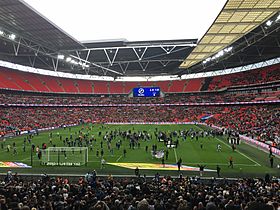
Millwall has averaged about 12,000 fans per home game over their 93 seasons in the Football League. The club and its fans have a historical connection with crowd trouble. The BBC documentary Panorama in 1977 showed this connection, which was very damaging for the club. Former chairman Reg Burr once said, "Millwall are a convenient coat peg for football to hang its social ills on."
The reputation for trouble goes back over 100 years. In a game against West Ham United in 1906, a local newspaper reported fights among spectators. In the 1920s, Millwall's ground was closed for two weeks after a goalkeeper was hit by objects and then attacked in the crowd. The ground was closed again in 1934 and 1947 due to crowd disturbances and pitch invasions. In 1950, the club was fined after a referee and linesman were attacked outside the ground.
In the 1960s, reports of crowd trouble became more common. In 1965, during a game against Brentford, a dummy hand grenade was thrown onto the pitch from the Millwall end. In 1967, when Millwall's 59-game unbeaten home record ended, the away team's bus windows were smashed. The FA ordered the club to put up fences around the stadium.
On March 11, 1978, a riot happened at The Den during an FA Cup game between Millwall and Ipswich Town. Fighting broke out and spilled onto the pitch, injuring many fans. In 1982, chairman Alan Thorne threatened to close the club because of trouble after an FA Cup loss.
The 1985 Kenilworth Road riot, after an FA Cup match between Luton Town and Millwall, was one of the most widely reported incidents of football crowd trouble. Many pitch invasions, fights, and objects were thrown. This led to Luton banning away supporters from their ground for four years. The FA investigated and fined Millwall, though the fine was later removed. The club's name became "synonymous with everything that was bad in football."
In May 2002, hundreds of people linked to Millwall were involved in trouble around the ground after a play-off game. Police officers and horses were injured. The then-chairman Theo Paphitis said Millwall couldn't be blamed for the actions of a few individuals. He later introduced a membership scheme for high-risk away games.
In January 2009, some Millwall fans caused trouble at an FA Cup game against Hull City. On August 25, 2009, Millwall played West Ham United in the Football League Cup. One Millwall supporter was stabbed during clashes outside the ground. Hundreds of West Ham fans invaded the pitch multiple times. Millwall was cleared of charges related to this incident, while West Ham was fined.
Manager Kenny Jackett said in 2010 that Millwall's crowd problems are often exaggerated by the media. This has led to a "siege mentality" among supporters, which is why they sing their famous chant, "No one likes us, we don't care."
In April 2013, during an FA Cup semi-final against Wigan Athletic, violence broke out in the Millwall section of the stand, leading to arrests. In January 2014, a Millwall fan damaged a linesman's flag. On May 29, 2016, during a play-off final at Wembley, some Millwall supporters broke through a barrier and attacked Barnsley supporters. This was condemned by the Football Association. On January 26, 2019, before an FA Cup game against Everton, an Everton fan was injured in clashes.
On December 5, 2020, during the first game back at The Den with fans after the COVID-19 pandemic, some Millwall fans booed players who took a knee to support anti-discrimination. This was widely criticized. In the next home game, Millwall fans applauded as players from both teams held up an anti-racism banner. Some Millwall supporters said their boos were not racist but were aimed at the Black Lives Matter movement.
Notable Supporters
| Name | Occupation |
|---|---|
| Danny Baker | Radio DJ and comedian |
| Michael Barrymore | Actor |
| Geoff Bell | Actor |
| Big Narstie | MC, rapper |
| Ted Cheeseman | Boxer |
| CM Punk | WWE wrestler |
| Bob Crow | Former RMT trade union leader |
| Daniel Day-Lewis | Actor |
| Madeline Duggan | Actress |
| Andy Fordham | Former darts world champion |
| Lars Frederiksen | Singer in Rancid |
| Johnny Garton | Boxer |
| Steve Harley | Singer in Cockney Rebel |
| Frank Harper | Actor |
| Blake Harrison | Actor |
| Tamer Hassan | Actor |
| David Haye | Retired boxing world champion |
| Rod Liddle | Journalist |
| Lord Ouseley | Kick It Out Founder |
| Nick Love | Film director |
| Kellie Maloney | Former boxing promoter, born Frank Maloney |
| Roland Manookian | Actor |
| Louie McCarthy-Scarsbrook | Rugby player |
| Laila Morse | Actress |
| Patrick Murray | Actor, Mickey Pearce in Only Fools and Horses |
| Des O'Connor | Entertainer |
| Gary Oldman | Actor |
| Theo Paphitis | Entrepreneur, Dragons' Den |
| Scroobius Pip | Musician |
| Timo Soini | Politician |
| Gregg Wallace | MasterChef presenter |
| Denzel Washington | Actor |
| Ian Wright | Former footballer |
| Zerkaa | YouTuber |
Images for kids
In the Community
In 1985, the club started the Millwall Community Trust (MCT). This trust offers sports, education, and charity projects. It is located next to The Den stadium. The Trust works with local people from the nearby areas of Lewisham and Southwark.
The Trust provides sports and fitness programs, educational workshops, activities for people with disabilities, and soccer schools. The club also helps to promote awareness against knife and gun crime. In a match against Charlton Athletic in 2009, both teams wore special uniforms to honor local teenagers and supporters who had been murdered. The shirts had the message, "Street violence ruins lives." The club has also helped raise over £10,000 for the charity Help for Heroes.
See also
 In Spanish: Millwall Football Club para niños
In Spanish: Millwall Football Club para niños
- Millwall Lionesses L.F.C.
 | James B. Knighten |
 | Azellia White |
 | Willa Brown |


